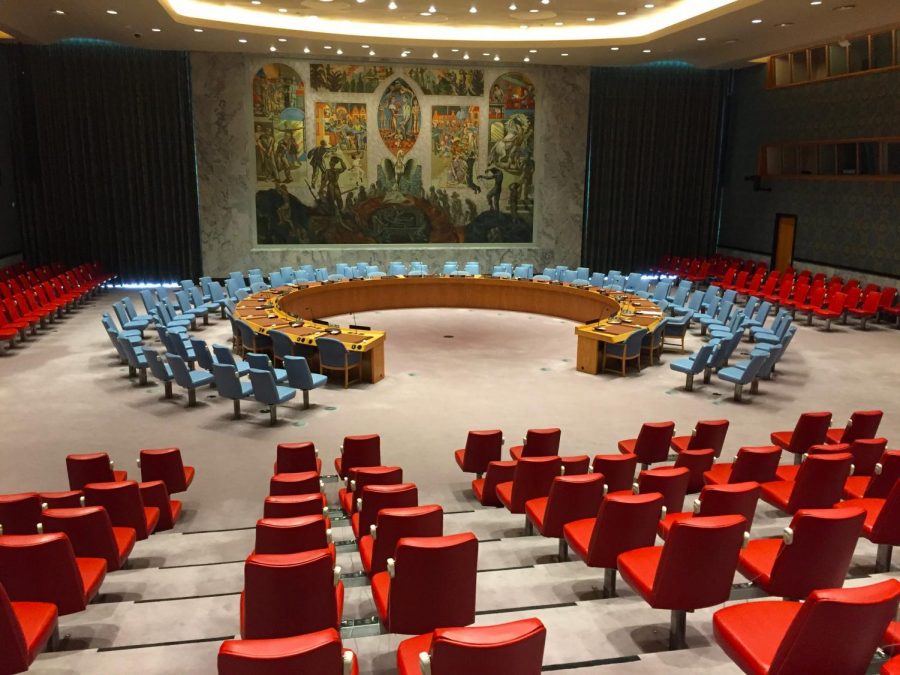How Long Will the United Nations Last?
Amidst the rapid change of events across the globe and societal unrest, the fate of the world’s greatest organization is unclear.
Photo by Anson Zhou
The United Nations Security Council Room
January 17, 2018
For the last seven decades, the United Nations has been of great global influence in various areas from human rights to disease eradication. However, as long as the body has existed, there has been controversy on its equality of representation and its ability to enforce rulings. Though it must be admitted that the UN has done significant good for humanity, its faults cannot be ignored. In the media today, the flaws of the international organization are most definitely recognized, but the issue, in America and across the world, is how long they will be tolerated.
The United Nations predecessor was the League of Nations, established in 1920 after the first World War. It was the first organization of its kind and was formed as a means of settling disputes at the international level in order to quell any possibility of another great war. With the outbreak of World War II just two decades later, clearly, it was ineffective. The League was flawed from the start. With lack of participation from worldly powers such as the United States, domination from France and England, and lack of legal ability to enforce reform, it was almost unsurprising to see it live such a short history.
After the end of WWII, the brand-new United Nations was formed – with its shiny new headquarters in New York City, global participation, and a greater ability to wield power, it seemed that the organization could do some good. And even now it still does. In fact, their accomplishments seem to pile up:
- Eradication of smallpox by 1980; campaign spearheaded by the UN
- Sponsored the conference which produced the Montreal Protocol, calling for the reduction of chlorofluorocarbon emissions; today, the ozone layer appears to be showing signs of recovery
- Negotiated the end of the Korean War in 1953, forming the demilitarized zone between the North and the South that still exists today
- Created a mandatory arms embargo in 1977 against South Africa in response to the apartheid system
- Negotiated for peace in the Iran-Iraq War in 1988, for which the UN won the Nobel peace prize
- In response to the Indian Ocean tsunami, the UN created a relief fund in 2004, raising a record $6.25 billion
- Paved the way for 80 former colonies to independence
In a dark turn, the complaints and controversies about the United Nations seem to pile up as well. Though the flaws of the League of Nations were carefully avoided in the creation of the UN, not all issues can be pushed away. In order to give the UN more power than its predecessor, a Security Council was created in the beginning where decisions made would be binding to all member-states. As with all things, one solution just led to another problem. The United States and other worldly powers, afraid of being tied to Security Council decisions, refused to become member states. Given that the League had failed due to lack of global contribution, the UN was forced to make a compromise and gave the U.S. and four other nations (Great Britain, France, Russia (formerly Soviet Union), China) veto power in the council. With that power, the aforementioned nations could block any resolution from being passed. Again, the power landed in the laps of the elite and over the years, the U.S. and Russia in particular have been accused of abusing their power. Of course, this is only one example of the bodies’ controversies/criticism – the list goes on:
- UN aid workers from Nepal were identified as the cause for a cholera outbreak in Haiti in 2010, killing 10,000 Haitians and sickening hundreds of thousands more
- Peacekeeping troops were withdrawn from Rwanda during the Rwandan Genocide, leaving many to die; similar situations occurred with other peacekeeping missions
- It was revealed in 2017 that over 100 peacekeepers had been running a child sex ring in Haiti; none were ever jailed
- The UN Oil-for-Food program was accused of being corrupted and having money being diverted unlawfully to various officials
- UN sanctions are seemingly ineffective as North Korea continues to develop its ballistic missiles and nuclear program
Even the United States, as one of the founding members of the United Nations has not recently been in great support of the international organization. In December of 2017, President Donald Trump declared Jerusalem the capital of Israel, sparking protest all around the world. In the United Nations, the Security Council voted on a resolution to force the U.S. to retract its recognition of Jerusalem as Israel’s capital. The results? 14-1, with the United States fearlessly using its veto power. A similar non-binding resolution was passed with similar results in the all encompassing General Assembly. In face of the strong international criticism, Nikki Haley, U.S. Ambassador to the UN slammed the organization stating, “Today, for the simple act of deciding where to put our embassy, the United States was forced to defend its sovereignty. The record will reflect that we did so proudly. Today, for acknowledging a basic truth about the capital city of Israel, we are accused of harming peace. The record will reflect that we reject that outrageous claim.” With a reaction from the U.S. government like this, a reduction in American monetary contribution to the UN may be in the realm of possibility. Being that the U.S. contributes to a staggering 22% of the organization’s annual budget, this sort of threat holds heavy weight.
So, is the end of the road looming for the United Nations, or are its benefits just something the world cannot lose? The organization has had a history of over seven decades, turning over mountains all over the world. The fate of this international body may not be clear, but one thing is for sure – we are in for a rocky ride for the next few years.












